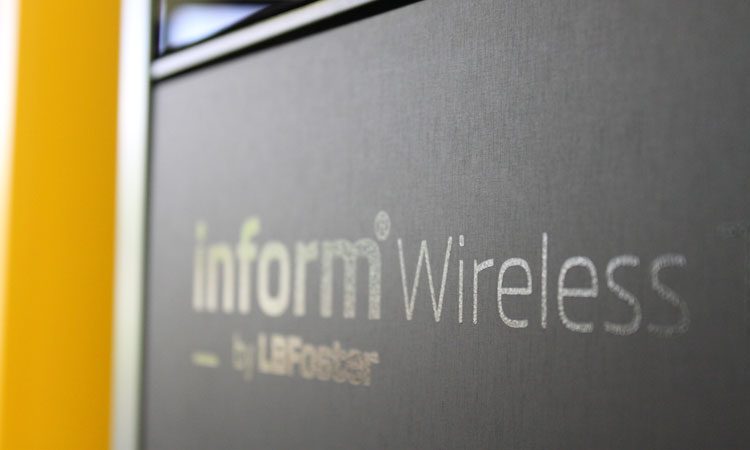Mobile information totem ready for take-off
- Like
- Digg
- Del
- Tumblr
- VKontakte
- Buffer
- Love This
- Odnoklassniki
- Meneame
- Blogger
- Amazon
- Yahoo Mail
- Gmail
- AOL
- Newsvine
- HackerNews
- Evernote
- MySpace
- Mail.ru
- Viadeo
- Line
- Comments
- Yummly
- SMS
- Viber
- Telegram
- Subscribe
- Skype
- Facebook Messenger
- Kakao
- LiveJournal
- Yammer
- Edgar
- Fintel
- Mix
- Instapaper
- Copy Link
Posted: 20 August 2019 | L.B. Foster | No comments yet
Mobile apps frequently supplement in-terminal passenger information displays, providing up-to-the-minute news on delays and cancellations; fixed totems deliver advertising messages and waymarking helps travellers navigate the airport.


But what happens when important information needs to be delivered in specific places at unplanned times? That’s where the wireless, mobile disruption information totem comes into its own, according to managers at Bristol Airport and Gatwick Airport.
With global airline passenger numbers expected to double to 8.2 billion by 2037, according to iata, increasing pressure on airport infrastructure requires ever-smarter ways to deliver information to travellers, when and where it is needed.
But what happens when important information needs to be delivered in specific places at unplanned times? That’s where the wireless, mobile disruption information totem comes into its own, according to managers at Bristol Airport and Gatwick Airport.
With global airline passenger numbers expected to double to 8.2 billion by 2037, according to iata, increasing pressure on airport infrastructure requires ever-smarter ways to deliver information to travellers, when and where it is needed.
Case study: Bristol Airport
Bristol Airport is the ninth busiest airport in the UK in terms of passenger traffic, with over eight million passengers in 2018. Its own expansion plans aim to boost passenger numbers to 12 million by 2026 and 20 million by the mid-2040s. Such ambitious growth means future-proofing the airport is an ongoing challenge. Jackson Thomas is Business Improvement Engineer at Bristol Airport and he is tasked with finding ways of making the airport operate more efficiently, both for passengers and operators. He said: “Airports are extraordinarily busy places, with thousands of people wanting to get from A to B with minimum fuss.
“Under normal operating conditions, our fixed signage and information infrastructure provides all the waymarking, travel information and passenger details necessary to make onward travel seamless. But airports cover large areas and are prone to disruption. It’s our duty to get information to our customers to keep them up to date at all times and minimise concerns.
“We have been exploring new ways to communicate with the travelling public as quickly and as effectively as we can. Towards the end of 2018 we embarked on a trial with L.B. Foster TEW Engineering. L.B. Foster has developed a mobile, wireless, battery-powered totem that uses Wi-Fi technology to deliver digital information, from important customer notices to messages welcoming passengers to the airport.
“What makes L.B. Foster’s solution stand apart is the fact the wheeled unit can move anywhere around the airport. It can operate inside and outdoors, which is a real positive as we used it on the outside concourse at Christmas to let people know that our bus forecourt had moved temporarily.”
Case study: Gatwick Airport
Gatwick Airport, the second-busiest airport by total passenger traffic in the UK, is also trialling an Inform mobile totem. With almost 50 million passengers passing through the airport annually, Inform by L.B Foster is being used to provide up‑to‑the-minute passenger information inside and outside terminals.
David Swain, South Terminal Operations Manager, London Gatwick Airport, said: “As the Terminal Operations Manager for the South Terminal, I understand the importance of displaying passenger information in a format that is engaging and useful.
“We are always looking for new ways to improve the passenger journey and be more efficient in giving information in a timely manner; embracing new technology is a big part of this and our passengers expect it. The flexibility of the L.B. Foster Inform totem display screens has given us a dynamic way of displaying different information to suit different situations, such as assisting passenger airport wayfinding during disruption, or during the implementation of new projects.
“My team member Emma Backhurst (Terminal Shift Manager) commented that when using the totem, she found some of the design features set the unit apart from others. It is extremely easy to move around, has a 24-hour battery time and only a four-hour charging cycle. This is really important when you work in a fast-paced environment like Gatwick and the clarity of the display is excellent.
“The team at L.B. Foster has been great to work with and made trialling the unit stress-free. They have also gone above and beyond with helping us last minute during a project, really showing us how quick it is to display information on a tight schedule.
“The totem has proven to be very user-friendly with only a short presentation needed to train staff, the simplicity of deploying it has been a great advantage when choosing where it can be best used. In a short time, the trial has generated multiple enquiries from different projects around the business in passenger-facing areas. We are glad to be working with L.B. Foster and hope to grow a long-term relationship, delivering improved communications to Gatwick’s passengers together.”
The solution: Inform
Inform by L.B. Foster was launched into the rail sector in 2017 as the UK’s first battery-powered totem display, delivering a completely self-contained, wireless solution to mobile information messaging. The totem’s intelligent Content Management System (CMS) is another smart technology solution. Display content can be updated on the go from a tablet or laptop. That means information is up to the minute with update s made live in real time.
Dagan Bradbury, Project Manager, L.B. Foster TEW Control and Display, is part of the team behind the development of Inform. He is acutely aware of the safety and security implications when designing and specifying mobile electronics for use in the airport and rail sectors. He said: “New products specified for use in airports and stations need to be tested to ensure they perform to the highest level under destructive forces.”
The Aviation Security In Airport Development (ASIAD) is a UK Government policy document intended to guide those in the planning, design and development of new airports and terminals, as well as those who have responsibility for management, maintenance and refurbishment of existing airport facilities. Its scope includes all airport infrastructure, not just security facilities.
A joint government agency guidance document was produced by the Department for Transport in 2012, entitled ‘Security in Design of Stations (SIDOS) guide’.
Typical physical security measures encompass minimising the effects of an explosion, considering structural robustness, and minimising the use of glass as a cladding material.
Crossley Consult is a leading independent firm of engineers, consultants and technical specialists with expertise in the design and use of structural glazing within the urban environment. Mike Crossley said: “Inform by L.B. Foster was tested and performed well to standards designed to keep airports and railway infrastructure safe, ASIAD 2017 (Aviation Security In Airport Development), SIDOS 2019 (Security In the Design Of Stations)”.
Bradbury continued: “Getting the green light that Inform is suitable for use in airports and on stations is a real bonus. We knew that its mobility, combined with Wi-Fi and battery power, gave us a real USP in the market, but the fact it performed well under ASIAD and SIDOS testing means we have stolen a lead on our competitors.”
Innovating solutions
Graham Kett heads up L.B. Foster’s software development technical support team. He said: “Inform by L.B. Foster is a great example of how we are developing new products and service solutions that are opening up new market opportunities across the group.
“Since introducing our Mark 1 back in 2017, we have introduced a number of innovative new features. The Mark 1 model replaces digital whiteboards and has become the on-point commuter information delivery for Customer Information System (CIS) disruption. Now we have launched a touchscreen version. This allows users to interact with the unit in much the same way as using a smartphone. Near Field Communication (NFC) detects and then enables technology in close proximity to communicate without the need for an internet connection. It’s easy, fast and works automatically, so you can transfer information, such as flight times, gate information and onward travel directions, straight to your phone.”
The interactive Inform Touch edition is available in two options; a mains-powered, wall-mounted unit and as a standalone, wireless, battery-powered totem. Further functionality includes the integration of e-pay and contactless ticketing, where travel information is stored virtually on a mobile handset without the need for a physical ticket.
Inform’s integrated remote monitoring technologies enable airport maintenance staff to keep an eye on critical performance issues, such as battery life and power usage, online. They can then take appropriate actions to ensure continuity in service. Enhanced battery performance means the unit can operate for longer between charges. Battery charging is now integrated into the Inform unit, without the need to remove batteries.
Other vital information, such as accessible routes through the airport, can be accessed using Inform’s smart touchscreen technology. Screens can be flipped to allow wheelchair users to interact with the unit. The system’s unique DigitalProMedia app is used to connect, manage and control the totem’s content. A dedicated helpline provides technical advice.
Kett continued: “The totem has so many potential uses – from helping people find their way around large cruise ships to providing information updates at festivals and at airports and on the railways.”
Options for Wi-Fi and 3G/4G mobile communications allow this unique display to connect to a variety of information systems.
The range of displays, including the Disruption Management System, are designed and manufactured to Section 12 standards. Low smoke and fume components and sealed IP67 enclosures allow the unit to work inside or outside in any weather.
The view from the vendor
SmartAirports: Improving customer journeys
The increasing popularity of air travel means airports now host millions of travellers each year. Keeping people informed with up-to-date information is key to positive experiences.
So what does smart journey planning look like? At L.B. Foster our innovation team has been developing technologies that will help deliver the SmartAirport. This is about demonstrating how dynamic information delivered through mobile devices and displays helps travellers make more informed decisions.
Alastair Norman, at L.B. Foster, explained: “We’ve all experienced flight delays and travel disruption. SmartAirport is all about providing essential information to improve the user experience. Imagine being able to check which coffee shops have seating available, or which restaurant has the shortest queues, or being able to check flight status in real time so you can delay leaving home in the event of delays. That saves hours wasted waiting at the airport.”
SmartAirport will deliver improvements to current customer information systems in three areas:
- Dynamic wayfinding depending on service and airport usage
- Dynamic service updates with live flight details
- Dynamic disruption management using near-field communication technology.
Making best use of existing mobile screen technologies in an integrated solution, users will have a more consistent and seamless experience at the airport, with a level of personalisation not available with current deployments.
As the service situation evolves during the day, information screens can be updated remotely by staff to advise travellers of changes to the journey in a more accessible way.
Display screens will have the ability to interact with people’s smart devices to provide more detailed and personal information related to the current journey. SmartAirport will integrate NFC and touchscreen displays to deliver localised information to the traveller wherever needed within the journey.
Norman concluded: “SmartAirport is all about putting the power of information into the hands of the user. It will change how we navigate our way around airports, improving the passenger experience and enabling everyone to make more informed decisions about journey planning.”
Issue
Related topics
Apps, Information technology (IT), Passenger experience and seamless travel, Passenger volumes


















